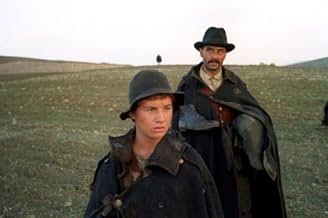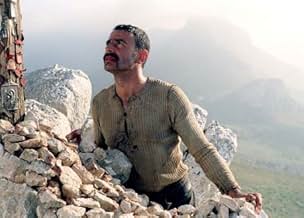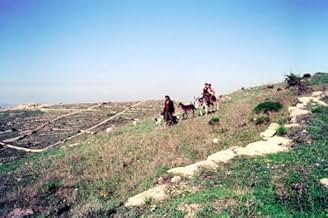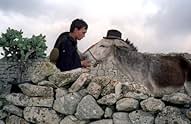A Sicilian peasant begins the journey to the promised land and meets a beautiful Englishwoman. But neither is prepared for the harsh realities of Ellis Island. Can they make it through the g... Read allA Sicilian peasant begins the journey to the promised land and meets a beautiful Englishwoman. But neither is prepared for the harsh realities of Ellis Island. Can they make it through the golden door to the America of their dreams?A Sicilian peasant begins the journey to the promised land and meets a beautiful Englishwoman. But neither is prepared for the harsh realities of Ellis Island. Can they make it through the golden door to the America of their dreams?
- Director
- Writer
- Stars
- Awards
- 22 wins & 29 nominations total
- Il Gatto
- (as Paride Benassai)
- Dottore
- (as Giuseppe Cutino)
- Mangiapane
- (as Massimo La Guardia)
- Director
- Writer
- All cast & crew
- Production, box office & more at IMDbPro
Featured reviews
3 / 5
I got drawn to this movie because it tells of immigrants from Sicily who traveled to America. I imagine much the same as my Grandfather did at that time. Travelling in steerage to provide ballast for the ships, I cannot imagine it was very comfortable, as shown in this film.
Laws restricting immigrants existed. I would guess that these laws were more strict on those who came from the Mediterranean and Africa. Immigrants had to be free from contagious diseases or hereditary infirmities. In the film, we see physical and mental exams, the latter because of the view that low intelligence is heritable. Single women could not enter the country, on the presumption that they would become prostitutes, so most married single men already in the country, as arranged beforehand, at Ellis Island before entry.
This is the story of a British immigrant (Charlotte Gainsbourg), who arranges to marry a poor Sicilian (Vincenzo Amato). He is trying to get his family through with a son that is mute and a mother (Aurora Quattrocchi) that is considered feeble-minded. She was fantastic in the role, by the way.
You will also see character actor, Vincent Schiavelli, in his next to the last appearance. I don't know if his last film has been released. He plays a matchmaker, and is also very good.
It was a strange, but enjoyable film. It's not for everyone, as I imagine those who don't have some interest in the immigrant experience would find it rather slow.
Therefore, it started a debate about the too much intense flow of immigrants from Romania, generalizing them as criminals, everyone, indiscriminately.
I'm only 15, but I thought: what idea of affluence does Italy give to these poor people? How ever do they regard us as the Land of Plenty? Yesterday evening I finally saw NUOVOMONDO, and my question had an answer. When you have only a donkey and some goats, those propaganda postcards showing United States as a land with milk rivers and huge vegetables, makes such an impression.
NUOVOMONDO is really a must-see film. It balances an ethereal symbolism (milk rivers, glances' play, hard and rocky mountains, the name and character Lucy/Luce) and a cruel realism (the mass of hopeful people on the ship, the procedures at Ellis Island). There's a mixed cast, going from the angelic Charlotte Gainsbourg to the realistic Vincenzo Amato, till a bitter and smashing Aurora Quattrocchi as the mother. But was it really so hard to enter in the New World?
The only relief from the boredom (like the voyage) is the occasional Fellini-like impressionism: One prominently has characters swimming in milk (as in the "land of milk and honey") more than once. It could be argued that the director doesn't prepare the audience for the abrupt transitions into the formalist episodes, but I felt relief with them.
By contrast Mira Nair's recent Namesake is superior in telling an interesting story about identity and the new world, and Chaplin's Immigrant (1917) makes the boat ride a model of slapstick and the restaurant scene not only humorous but telling about the challenges immigrants inevitably face. Nobody ever said Chaplin was boring.
Charlotte Gainsbourg stands out as Lucy, a husband-seeking Brit whose literate background makes her useful, and whose role as a strong, beautiful woman allows the film to explore the prejudices against women. She is unforgettable when she and other women sit in a room awaiting the magistrate's permission to marry a man often the woman is meeting for the first time. That a woman would need a man to qualify for entry into America may not be so anachronistic given Hilary needing Bill to make her political career in the twenty first century.
Agnes Godard's cinematography is often the salvation of a scene, for instance when she catches two mountain climbers with rocks in their mouths deftly negotiating a rock-strewn hill top to arrive at a shrine. Mostly she photographs the climbers close up to keep the adventurous sense of surprise. Then she reduces them to just more rubble as she pulls back into a major bird's eye view losing them slowly just as their journey across the Atlantic will reduce them again.
It's a slow journey.
Guided by letters he read of immigrants sent to relatives who remained at home, Crialese identifies with those impoverished immigrants who were able to see the positive side of things beyond their ordeal. To Salvatore Mancuso (Vincenzo Amato) and his older son Angelo (Francesco Casisa), America is a distant dream that they know nothing about. After climbing a rocky mountain to pray to the saints for a sign, they are rewarded when they are shown post cards by Salvatore's younger son, Pietro (Filippo Pucillo), a deaf mute, that depict the new world as a land where they can bathe in rivers of milk, sit under a money tree, or harvest giant onions and carrots.
After disposing of their animals in exchange for shoes and suits, Salvatore, his two sons, and his elderly mother Fortunata (Aurora Quattrocchi) set out on their adventure with more hope than trepidation but the equation soon shifts the other way. As they board the boat and settle into their crowded third-class steerage compartments, the most-talked about scene in the film takes place. Using an overhead camera that shows masses of people standing, as the ship pulls away, the frame is divided into those aboard the ship and those waving goodbye from the dock and the way they are separated implies they are being torn asunder from everything familiar.
Aboard the ship is a mysterious English woman named Lucy (Charlotte Gainsbourg). Crialese does not reveal her past or the reason she is traveling to America but she seems to stand for the onset of the modern world they are entering. Though they eye each other cautiously, Lucy becomes interested in Salvatore and asks him to marry her in order to allow her to enter the country. The voyage is treacherous with a violent storm buffeting the ship. Shot in almost complete darkness, passengers in steerage are tossed against the side of the boat and, afterward, bodies lie tangled and twisted on the floor as if in a macabre Totentanz. The rite of passage through immigration processing at Ellis Island does not become any easier and Crialese attacks the way illiterate peasants, in the name of preserving "civilized" society, are forced to put puzzles together, perform mathematical tasks, and undergo humiliating medical examinations to prove they are "fit".
A marriage brokering ceremony feels like an auction block and the young women look despondent when they are matched with overweight middle-aged men. This is the only way they can enter the "Golden Door", however, since single women are rejected unless they have partners, ostensibly to prevent the threat of prostitution. Through the fog the immigrant's can barely see the land of milk and honey and there is no Statue of Liberty asking for the tired and the poor, the humbled masses yearning to breathe free. In their imagination, however, the river is still flowing, waiting for them to jump in. Though the ending is ambiguous and one door opens on to a blank wall, another door symbolizes a rebirth of the soul and the passage we must all take from the old world to the new.
Did you know
- TriviaDirector Emanuele Crialese personally chose every one of the 700 extras who appeared in the film. He said he was looking for people who could evoke the same facial expressions of the actual immigrants whose photographs Crialese came across when he was researching the film.
- Quotes
Lucy Reed: Madam? Madam. Could you lower your voice? I have a headache.
Fortunata Mancuso: Then have one! What do I care? Who does she think she is? This is the last thing I need. A journey like this ahead and she has a headache.
- SoundtracksFeeling good
Words and Music by Leslie Bricusse and Anthony Newley, Adapted and Performed by Nina Simone
- How long is Golden Door?Powered by Alexa
Details
- Release date
- Countries of origin
- Official sites
- Languages
- Also known as
- 燦爛新人生
- Filming locations
- Production companies
- See more company credits at IMDbPro
Box office
- Budget
- €10,000,000 (estimated)
- Gross US & Canada
- $1,070,769
- Opening weekend US & Canada
- $27,744
- May 27, 2007
- Gross worldwide
- $7,228,273
- Runtime1 hour 58 minutes
- Color
- Sound mix
- Aspect ratio
- 2.35 : 1
Contribute to this page






























